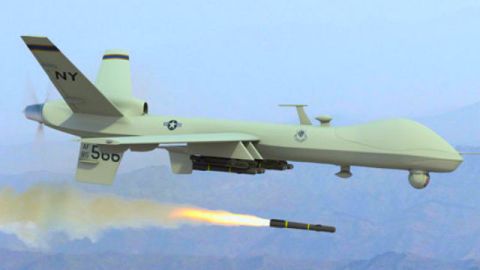The Kantian Case Against Drone Warfare

By Zane Friedkin (guest blogger)
The drone war being waged by the Obama administration in Pakistan, Afghanistan, Yemen, Libya, and Somalia has elicited more media attention than is typical of equally destructive U.S. foreign policy programs, more often than not ignored in the major domestic publications. The questions then arise: Why, and what are the implications for the future? A narrow reason is that the Obama administration wishes to debunk Republican claims that Obama’s foreign policy is “weak,” an absurd assertion by most objective standards.
A broader reason is that there is something intrinsically more disturbing about drone assassinations in comparison to other methods of warfare which even a highly obedient media finds at times difficult to ignore. As the U.S. transitions to methods of aggression that rely more heavily on remotely operated Predator drones (the Financial Times reports that drone use is up 700 percent under President Barack Obama), the people who order these murderous assaults are increasingly alienated from the process of moral deliberation that once was necessary when making the decision to kill a human being.
Nonetheless, the major establishment publications still argue overwhelmingly that the recent surge in drone warfare is a force for good, as in Scott Shane’s July 14, 2012 op-ed in TheNew York Times, “The Moral Case for Drones.” Shane argues that “some moral philosophers, political scientists, and weapons specialists believe armed, unmanned aircraft offer marked moral advantages over almost any other tool of warfare,” such as the abilities to “strike with precision” and “even divert a missile after firing if, say, a child wanders into range.” These remarkable technological feats are showcased in Pakistan, “the world’s unwilling testing ground for the new weapon,” which kills “fewer civilians than other modes of warfare.” At the very least, “the C.I.A. operators are improving their performance,” with a recent “notable drop in the civilian proportions of drone casualties, to 16 percent of those killed in 2011 from 28 percent in 2008,” numbers taken from a report by the London Bureau of Investigative Journalism.
That report, which provides the numerical basis for a study of drone warfare conducted by the New York University and Stanford law schools, contains illuminating information that Shane ignores. The NYU-Stanford study revealed that of the 2,562-3,365 victims of U.S. drone strikes, only two percent were senior terrorists; 474-881 were civilian noncombatants, including 176 children, from whom missiles were not diverted. The other victims were presumably low-level enemy combatants. But it is perhaps of interest that the Obama administration automatically considers any male of military age killed in a drone strike an “enemy combatant,” explaining claims of “surgically precise” strikes with no “collateral casualties.” (As of August 2011, the White House still insisted that it had “not found credible evidence of collateral deaths resulting from US counterterrorism operations outside of Afghanistan or Iraq.”)
The London Bureau of Investigative Journalism accepts the White House definition, thereby systematically underestimating the number of civilians actually killed by drones. Accordingly, interviews of victims’ families conducted by Pakistani lawyer Mirza Shahzad Akbar yield more disturbing data, suggesting that “civilian casualties accounted for 74 percent of the death toll” (Truthout). What’s more, the NYU-Stanford study shows that Pakistanis, Yemenis, and Somalis live in constant fear of drone strikes on innocent civilians, with many residents in the kill zone exhibiting classic symptoms of Post-Traumatic Stress Disorder.
In the words of Andrew Cockburn, “The pervasive fear among Waziris [is that] anyone can be a target at any time”— reasonable anxieties, considering that the identities of most drone assassination targets are not known to the C.I.A. but rather are selected based on behavioral patterns, the criteria for which is not known (Wall Street Journal).
The NYU-Stanford study was featured openly in most European publications but was absent from the main pages of most American newspapers, including the New York Times, where the only reference to the report came briefly in the last paragraph of an account of a successful drone assassination of an Al-Qaeda leader.
What Scott Shane took from all this was that “the C.I.A. operators are improving their performance.”
Other advocates of drone warfare, such as Avery Plaw, contend that “states have a primary responsibility to protect their own citizens,” and presumably to decimate entire nations and cultures in pursuit of these noble objectives. Additionally, Christine Fair points out that “no forensic experts have been employed to verify claims about injuries to discern if they comport with ballistics and weapon effects associated with drone-delivered munitions.” By the same logic, we should not accept that six million Jews and six million others were killed in the Holocaust because forensic experts have not been employed to link each body to a Nazi oven or gas chamber or gun.
The only real reservation about the drone strikes expressed by Shane, Plaw and other proponents is the future possibility of “uncontrolled proliferation,” meaning proliferation that might place the technology in the hands of states that do not do as we instruct.
Here, it is instructive to invoke the categorical imperative of Immanuel Kant, the 18th-century German philosopher. Kant believed that in order for an action to be moral, its maxim — that is, the implications of the action, separated from the particular circumstances surrounding the action, including the identity of the person performing the action — must be viable as a universal law: “Act only in accordance with that maxim through which you can at the same time will that it become a universal law.” In a way, this “universality formula” is simply one of many examples of the broader concept of reciprocal morality, which has pervaded many cultures and moral codes, spanning millennia. There are certainly problems with the universality formula: the task of devising a single formula to dictate all human morality is ultimately futile for the simple reason that human morality is not an axiom system — there are contradictions; for instance, infinite variations of qualifications may be applied to a maxim, and in each case, the formula might give a different result. Still, the basic concept of universality underlying the formula is worthwhile and has laid the groundwork for the philosophy of moral universalism, explained in simple terms by linguist Noam Chomsky: “If something’s right for me, it’s right for you; if it’s wrong for you, it’s wrong for me. Any moral code that is even worth looking at has that at its core somehow.”
The insights allow us to examine the issue of drone warfare with more clarity. As mentioned earlier, some pro-drone pundits, including Shane and Plaw, fear the threat of “uncontrolled proliferation.” So too does Geoff Dyer of the Financial Times, who reports that “US [drone] actions are being observed by other major powers, such as China and Russia, which may one day use them as a precedent.” The underlying assumption is that the right to aggression is unilateral. Imagine the response from the US defense department if a Yemini insurgent group were to develop its own Predator drone and send it to the United States to assassinate a citizen identified by behavioral patterns. Yemen would likely be subject to massive destruction. The establishment position on drone warfare and on the rights to the technology of aggression thus clearly violates Kant’s universality principle. The position appears to represent a perverse mode of moral relativism, whereby standards are different depending on who is performing the action. We may term this moral unilateralism – the pervasive feature of U.S. foreign policy, and indeed of superpowers throughout history.
We may also apply Kant’s humanity-as-an-end formula of the categorical imperative to the issue of drone warfare: “Act so that you use humanity, as much in your own person as in the person of every other, always at the same time as end and never merely as means.” Advocates of drones, as we have seen, tend to see the broader war effort as justified. Civilian deaths are therefore “collateral damage,” inevitabilities, externalities, necessary as we pursue our noble objectives. Thus, innocent civilians killed are perceived not as an end but as a means to an end — further evidence that drone policy clearly violates core principles of Kantian morality. We may see Kant’s humanity principle as a direct metaphysical condemnation of exploitation — literally, the use of humans as means to a further end.
Perhaps the reason the drone strikes have elicited more media attention than is typical of U.S. foreign policy programs is because, as remotely controlled machines, they are so startlingly devoid of morality. Remotely controlled drones represent a significant step in alienating humans from the very real and often destructive consequences of their actions. What’s more, because drone attacks represent no risk for those who hold the clubs, they signify a step away from the intense strategic and moral deliberation that was once necessary when making decisions as momentous as that of taking another human being’s life.
Drones do not have minds. They cannot contemplate Kant or Hume or Nozick or anyone else. They are robots. They have no sense of duty or free will or conscience or guilt. Drones are, in the words of Conn Hallinan, “soulless killing machines.” Perhaps the recent uncharacteristic media attention to the drone strikes is a reaction, conscious or unconscious, to a significant step down a slippery slope to a world voided of morality by technology.
Zane Friedkin is pursuing an Associate of Arts degree at Bard High School Early College-Manhattan.
Follow Steven Mazie on Twitter: @stevenmazie





